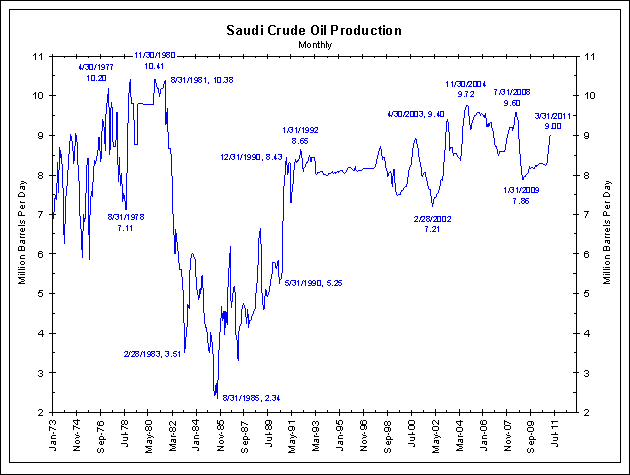<Click on chart for larger image>
- The Wall Street Journal – Saudi Oil Production Doesn’t Add Up
Recent oil production figures from Saudi Arabia, the world’s largest oil exporter, simply don’t add up. There are competing explanations for this inconsistency. Some analysts claim that the increase in oil production Saudi officials promised in late February to compensate for lost Libyan supplies was fictitious. Statements from the Saudis themselves imply that the kingdom cut its production several weeks later much more sharply than reported. But either scenario contradicts previous statements from Saudi officials. This muddy picture of what the OPEC kingpin is up to is troubling in an oil market already suffering from high prices and extreme uncertainty. Saudi Arabia’s Oil Minister Ali Al-Naimi told reporters in Kuwait last week: “The market is overbalanced … Our production in February was 9.125 million barrels per day, in March it was 8.292 million barrels per day.” Assuming Mr. Al-Naimi was following OPEC norms and quoting average production figures for those months, his numbers are odd to say the least. Shortly after the civil war in Libya erupted in February and halted much of the country’s 1.3 million barrels a day of oil production, Saudi Arabia promised to quickly fill the gap. On February 28 Saudi officials said they would raise production to 9 million barrels a day–swift action that reassured oil consumers that unrest in the region wouldn’t result in supply shortages. However, Mr. Al-Naimi’s statement contradicts this version of events. According to him, Saudi Arabia was already producing an average of 9.125 million barrels a day in February, before the output hike in response to the situation in Libya.
Comment
- Reuters – (May 21, 2008) OPEC Oil Supply Rising in May: Petrologistics
OPEC has kept official supply limits unchanged at meetings this year, saying consumers are well supplied and has blamed factors beyond supply and demand for oil’s rally, such as the weakening U.S. dollar. Even so, the Petrologistics estimate suggests the 12 OPEC members bound by deals to set supply policy, all except Iraq, are producing 29.83 million bpd, more than their informal target of 29.67 million bpd. Petrologistics assesses OPEC supply, which excludes oil produced but sent into storage rather than exported, by tracking tanker shipments. OPEC itself does not issue timely estimates of its members’ output.
Could there be a more important economic statistic than world-wide crude oil production? Could there be a more imprecise way of calculating these numbers? If the number were completely made up, would it be any less accurate than this method?


Investor Jim Rogers made this claim in March.
As we detailed in 2008, the Saudis do not allow independent verification of oil production. They just tell the world what it is:
One of the more intriguing stories in “Twilight in the Desert’, Matt Simmons’ 2005 book on the state of Saudi fields, is the paucity of reliable data on Middle East production in general and Saudi production, specifically. Simmons is one of the first people to point out the fact that much of the data underlying “official” production numbers are unreliable, based largely on the findings of Petrologistics, a “powerful” information collecting company located over a supermarket in Geneva, Switzerland.
This data, Simmons alleges, is gathered from a worldwide network of harbor “spies” located in the world’s top oil exporting countries. “They look through a pair of binoculars and a sort of a gauge in their windows to check [tanker] plumb lines as to how much oil is being loaded into the tankers. And [Conrad Gerber’s] story is he can’t disclose the names of his harbor spies; he can’t even call them at home because when he used to do that, one of them got killed.
What’s interesting is that there are twenty other sources that report Middle East oil, but they all seem to get their first data from Petrologistics. And again, no one has ever questioned the accuracy of this data, Simmons explained. He pointed out the obvious problem that even with harbor spies using binoculars and plumb lines, there is no way to know the grade of the oil, how much is being pumped aboard the vessel, or its ultimate destination.
“You have no idea if its 1.8 million barrels or 2.2 million barrels. You have no idea where the tanker’s going,” he said. “But again, no one ever thought about where this data comes from.”
“We have an energy data system created today that is simply rubbish.”
Because of this lack of independent verification, the world relies on a two-person firm of Conrad Gerber and his daughter by the name of Petrologistics. They operate above a supermarket in Geneva, Switzerland and have a network of secret harbor spies looking at ships through binoculars to determine world production. Petrologistics does not have a website.
If we pitched this as a Hollywood movie theme it would be rejected because no one would believe it!
Does the world take Petrologistics seriously? Consider the following Reuters story from May 21, 2008: